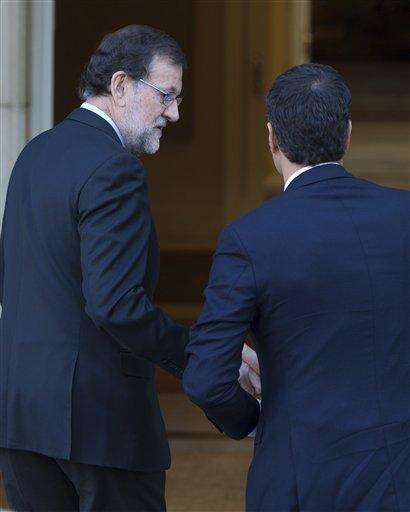Spain's acting Prime Minister Mariano Rajoy, right, speaks with main Socialist opposition leader Pedro Sanchez during a meeting at the Moncloa Palace in Madrid, Spain, Wednesday, Dec. 23, 2015. Spanish Prime Minister Mariano Rajoy will meet with Sanchez to launch complicated talks on forming a coalition or minority government after his party won the most votes in national elections but fell short of a parliamentary majority. If there is still deadlock after two months, King Felipe VI calls a new election. (AP Photo/Paul White)
The Associated Press
MADRID (AP) - The leader of Spain's opposition Socialists said Wednesday he will not support any effort by acting Prime Minister Mariano Rajoy to stay on in his post via a coalition or a minority government.
Pedro Sanchez made the declaration to reporters after meeting with Rajoy, who is trying to negotiate a way for him and his center-right Popular Party to remain in power after it won the most votes in a national election Sunday but fell far short of a parliamentary majority.
Rajoy did not comment after the two met at the presidential palace. The splintered vote that marked the end of three decades of two-party domination in Spain gave Rajoy's party 123 seats in the 350-member lower house of parliament, down from the 186 it won in 2011. The Socialists got 90 seats, followed by the far-left Podemos and allies with 69 and the business-friendly Ciudadanos with 40.
Sanchez reiterated that it's up to the Popular Party to first try to form a government because it got the most votes but said he would try to forge one if the Popular Party can't.
Spain has never had a "grand coalition" of its two main parties. Rajoy is scheduled to meet with the leaders of Ciudadanos and Podemos next Monday.
Analysts predict weeks or months of uncertainty before the country has a functioning government led by the Popular Party or the Socialist Party - or a new election in the spring if neither party succeeds.
Rajoy in January faces a parliamentary vote on whether he can reassume his position as the leader of the government. In the first vote, he would need more than 50 percent to form a government. If he falls short, he must get more votes for him than against him in a second ballot 48 hours later.
That's a lower bar allowing parties to abstain, letting a rival into power in return for concessions. Ciudadanos has already said it will abstain, but Sanchez ruled that out for his Socialists.
If there is still a deadlock after two months, King Felipe VI will call a new election.
Spain's acting Prime Minister Mariano Rajoy, left, shakes hands with main Socialist opposition leader Pedro Sanchez before a meeting at the Moncloa Palace in Madrid, Spain, Wednesday, Dec. 23, 2015. Spanish Prime Minister Mariano Rajoy will meet with Sanchez to launch complicated talks on forming a coalition or minority government after his party won the most votes in national elections but fell short of a parliamentary majority. If there is still deadlock after two months, King Felipe VI calls a new election. (AP Photo/Paul White)
The Associated Press

Spain's acting Prime Minister Mariano Rajoy, left and main Socialist opposition leader Pedro Sanchez enter the Moncloa Palace for a meeting in Madrid, Spain, Wednesday, Dec. 23, 2015. Spanish Prime Minister Mariano Rajoy will meet with Sanchez to launch complicated talks on forming a coalition or minority government after his party won the most votes in national elections but fell short of a parliamentary majority. If there is still deadlock after two months, King Felipe VI calls a new election. (AP Photo/Paul White)
The Associated Press

Spain's acting Prime Minister Mariano Rajoy, left, shakes hands with main Socialist opposition leader Pedro Sanchez before a meeting at the Moncloa Palace in Madrid, Spain, Wednesday, Dec. 23, 2015. Spanish Prime Minister Mariano Rajoy will meet with Sanchez to launch complicated talks on forming a coalition or minority government after his party won the most votes in national elections but fell short of a parliamentary majority. If there is still deadlock after two months, King Felipe VI calls a new election. (AP Photo/Paul White)
The Associated Press